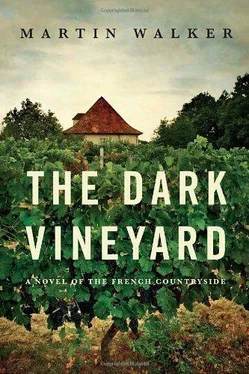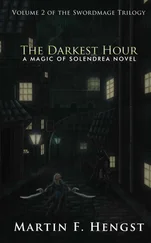Martin Walker - The dark vineyard
Здесь есть возможность читать онлайн «Martin Walker - The dark vineyard» весь текст электронной книги совершенно бесплатно (целиком полную версию без сокращений). В некоторых случаях можно слушать аудио, скачать через торрент в формате fb2 и присутствует краткое содержание. Жанр: Полицейский детектив, на английском языке. Описание произведения, (предисловие) а так же отзывы посетителей доступны на портале библиотеки ЛибКат.
- Название:The dark vineyard
- Автор:
- Жанр:
- Год:неизвестен
- ISBN:нет данных
- Рейтинг книги:5 / 5. Голосов: 1
-
Избранное:Добавить в избранное
- Отзывы:
-
Ваша оценка:
- 100
- 1
- 2
- 3
- 4
- 5
The dark vineyard: краткое содержание, описание и аннотация
Предлагаем к чтению аннотацию, описание, краткое содержание или предисловие (зависит от того, что написал сам автор книги «The dark vineyard»). Если вы не нашли необходимую информацию о книге — напишите в комментариях, мы постараемся отыскать её.
The dark vineyard — читать онлайн бесплатно полную книгу (весь текст) целиком
Ниже представлен текст книги, разбитый по страницам. Система сохранения места последней прочитанной страницы, позволяет с удобством читать онлайн бесплатно книгу «The dark vineyard», без необходимости каждый раз заново искать на чём Вы остановились. Поставьте закладку, и сможете в любой момент перейти на страницу, на которой закончили чтение.
Интервал:
Закладка:
“Go on,” he said.
“We got hold of the bank documents for Agricolae, which is what I was sent here to do. Don’t even ask how. But there’s a big payment from Bondino, 120,000 euros, a wire transfer from their American bank on July 7. It’s listed in the books as a research contract on drought-resistant vines. J-J needs to know about it, and you need to find out whether Agricolae was really the target of that fire because this means it might have been aimed at Bondino.”
“But we solved the arson case,” Bruno said. One part of his brain was focused on the conversation and the case. But elsewhere emotions were churning at the sound of her voice.
“I know. And J-J thinks your arsonist was murdered by Bondino. This deal between Bondino and Agricolae could be the link J-J needs to prove it. I’ve sent you a copy of the bank transfer by post so there’s no computer trace.”
“Thanks. I’ll let him know,” Bruno said, wondering why Isabelle had called him rather than J-J. “Why not call him directly?”
“Not wise, given the job I do and the trouble he’s in,” she said.
“The brigadier just told me J-J’s in the clear.”
“I’m glad to hear it. All the same, it’s safer to go through you.” She paused. “Besides, I wanted to hear your voice.”
Bruno closed his eyes. “I like hearing yours, too. I thought I might hear from you earlier.”
“I had a lot of work to do, and I was thinking,” she said. “And I reached a conclusion.”
“Go on.” Bruno was concentrating intensely, trying to divine every last scrap of meaning from the tone of her voice, the pauses between her words.
“If I see you again, it will be in Paris. That’s where my life is going to be.” The words came out in a rush.
“It wouldn’t work in Paris,” said Bruno. “I don’t fit there.”
“Not even for a visit?”
And prolong the agony again? Bruno shook his head in silence.
“We’ll see. You don’t have to spend all your life down there in the country,” she said. More silence. “I miss you.” And she hung up the phone.
Bruno took a deep breath, knowing his pulse was racing and telling himself that he had done the right thing by not responding to Isabelle’s invitation. It was the sensible reaction, the wise decision on his part, but a part of him wanted to throw wisdom to the wind and take the next train to Paris and embrace Isabelle and all her risks.
The phone interrupted his thoughts. It was Nathalie calling to say she had checked the files; they had received Jacqueline’s application on May 30. That was six weeks before the Bondino payment to Agricolae. But it was after she had met Bondino in the professor’s office and realized that he was heading for this part of France. So what had triggered Jacqueline’s decision to come to work in Saint-Denis? Bruno grabbed his cap and the keys to his van and ran down the stairs of the mairie, stopping only to pose a question at the Hotel Saint-Denis and to phone J-J and ask him to meet him at Pamela’s place as soon as he could.
40
Pamela was doing her accounts at the kitchen table when he arrived. A stack of bills and papers sat in front of her, and her glasses were perched on the end of her nose. She looked up, startled as he knocked and opened the door, and then smiled to see him. She came forward to place her hands on his cheeks and kiss him on the lips. He responded with enthusiasm, hugged her close to him and then moved his head back.
“Don’t misunderstand. I’d like to carry on kissing you for some time, but I’ve got pressing business,” he said. “You know those family photos and files that you saw in Jacqueline’s house? I need to look at them before she gets back, so I’ll need your key, please. It’s official-J-J’s on his way.”
She took off her glasses. “Is this legal? Do you need a warrant or something?”
“You’re the property owner. Did Jacqueline sign a lease?”
“Not yet.”
“Then it’s legal. Come on, we don’t have much time.”
Pamela took a key from a row of hooks on the wall and led the way. “Can you tell me what this is about?”
“I just found out that her mother’s maiden name is Bondino. There was a bitter family feud over the ownership of the vineyards, really bitter. So I need to see those files and photos. And since most of them will be in English I’ll need your help.”
Jacqueline’s closed laptop was on the table, a row of her wine books lined up behind it. In a fat briefcase below the table Bruno found the files, all unmarked but full of material about the Bondino family and its company. In the first file were photographs of people, and on the back of each one was a penciled name. Several depicted the man he knew from magazine photos as Bondino’s father, the head of the company. Some showed him as a vigorous youth. In one photo he was holding a baby girl in the crook of his arm. On the back it said simply “FXB, Maman, 1957.” That would be Francis X. Bondino, Fernando’s father. Maman presumably would be Jacqueline’s mother.
“This file is all about the Bondino company-business plans, accounts, revenue projections for this year and next year,” Pamela said, suddenly a model of brisk efficiency. “I wonder how she got hold of that? It’s all marked ‘confidential,’ though it looks pretty boring.”
“Let me see,” said Bruno. The numbers and columns and charts meant nothing to him. He leafed back to the first page, which was headed by a short list of names. It was dated August 20, last month. How had she obtained something so recent? “What’s that say?” he asked, pointing to a phrase at the head of the list.
“That says ‘Distribution Restricted,’ and it lists FXB and FXB Junior, and then two more sets of initials identified as those of the finance director and the sales director. I think that means they’re the only four people supposed to have this, so how did Jacqueline get it?”
“I don’t know, but she was already in France by then so she must have obtained it here somehow, maybe from Bondino.” Bruno paused. “Can you think of some reason why he might give this confidential stuff to her?”
“Maybe she just took it,” Pamela said. “Or maybe this was what she was after, here on the next page. It’s about Saint-Denis.”
“What?” Bruno came to look over her shoulder. “What’s it say about Saint-Denis?”
“It’s a report from the research station on drought-resistant vines, along with the photocopy of a bank transfer from Bondino to a company called Agricolae for 120,000 euros to finance the research here in Saint-Denis. There’s another bank transfer, 200,000 euros to a Paris company called Dupuy. The transfers are dated in July of this year.”
“No wonder Bondino was angry about the research station crops being burned,” said Bruno.
“How did Jacqueline get hold of all this? It’s like espionage. Do you think she told Max about Bondino and the research station?”
“That’s a very good question. What’s in the next file?”
It contained the details of a lawsuit, Bondino v. Bondino, that started in 1957 in California. Pamela sifted through the legal papers-affidavits, statements and notices of discovery-and came to a clipping from the San Francisco Examiner dated March 11, 1958. The headline read “Bondino Will Upheld,” and Pamela began giving a rough translation of the story.
“It begins: ‘The elder son of deceased Napa Valley wine magnate Silvio Bondino lost his share of the multimillion-dollar inheritance when the district court ruled that a disputed will was valid.’ Shall I go on?”
“No, this is familiar stuff. That battle over the will was where the feud began. It replaced an old will that divided the Bondino estate evenly between the two brothers, but then this new will turned up,” said Bruno, riffling through more photographs, some so old they were in shades of brown rather than black and white. Others had crinkled edges like ancient postcards. He held up an aged sepia print. “Here’s the founder of the family fortunes, Silvio himself, as a young man. He arrived in California from Italy back in the late nineteenth century.”
Читать дальшеИнтервал:
Закладка:
Похожие книги на «The dark vineyard»
Представляем Вашему вниманию похожие книги на «The dark vineyard» списком для выбора. Мы отобрали схожую по названию и смыслу литературу в надежде предоставить читателям больше вариантов отыскать новые, интересные, ещё непрочитанные произведения.
Обсуждение, отзывы о книге «The dark vineyard» и просто собственные мнения читателей. Оставьте ваши комментарии, напишите, что Вы думаете о произведении, его смысле или главных героях. Укажите что конкретно понравилось, а что нет, и почему Вы так считаете.












